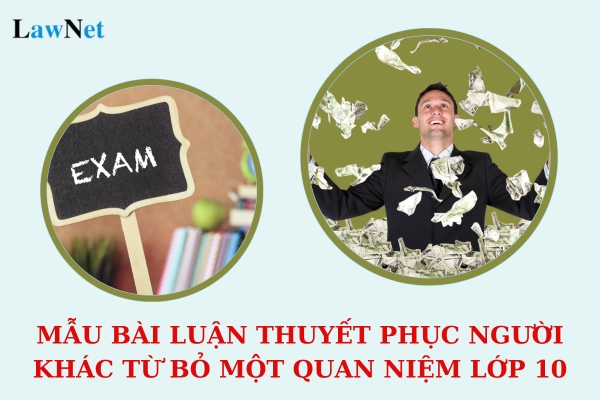|
Persuading others to abandon a concept
Sample 1: Persuading Others to Abandon the Concept "Money is Everything"
In modern society, money holds a very important role as a means to sustain life and meet many essential needs. Therefore, many people believe that "money is everything." However, this view is not only one-sided but can also lead to negative consequences. In reality, money is not the only thing of value, and to live a meaningful life, people need many other factors.
First of all, money cannot buy the spiritual values that people truly need to live a happy and fulfilling life. A person may have a lot of money, but if they lack love, sharing, and connection with others, they will still feel lonely. Genuine relationships, care, and support from family and friends are things that money cannot buy. Meanwhile, a life revolving solely around money can easily make people become materialistic, losing the deeper values and meanings of life.
Next, the concept "money is everything" can lead to blind competition, causing pressure on oneself and losing the joy of life. When people overly value money, they can easily fall into the whirlpool of ambition and greed. The race to earn money at any cost can cause them to neglect themselves, work to exhaustion, and even breach ethics and the law. This way, happiness is not only lost but also traded for other important values, such as health and dignity.
Moreover, the concept "money is everything" may result in belittling others and undervaluing non-material values. When people only value money, they tend to judge others based on wealth and possessions, overlooking qualities, talents, and emotions. This leads to a distorted lifestyle, creating distances between people, and losing balance and fairness in society.
Finally, money can help improve the quality of life but cannot ensure long-term happiness. Some achieve success and wealth but fall into spiritual crises, losing their direction in life because they equate money with the meaning of life. Conversely, many people do not have much money, but with a simple life, warm family relationships, and contentment in their soul, they still feel happy.
In conclusion, money is important, but it is not everything. To have a meaningful and happy life, each person needs to recognize that besides money, many other values need to be appreciated, such as love, health, and peace of mind. From there, we will live more balanced lives, not losing ourselves in the blind race for money and achieving complete happiness.
Sample 2: Persuading Others to Abandon the Concept "Learning is Only for Exams"
The concept "learning is only for exams" is quite prevalent in today's educational environment. Many students see learning merely as a means to achieve high scores in exams, thereby gaining reputation or good records on paper. However, this concept distorts the purpose of learning and causes negative impacts on both learners and society.
Firstly, learning is not just about achieving scores but also about the process of nurturing knowledge and skills for life. Knowledge is the foundation that helps each person understand the world around them, equipping them with problem-solving skills and developing independent thinking. When students only learn for exams, they do not focus on deeply understanding the issues but rather memorize mechanically to achieve high scores. This leads to rote learning, a lack of critical thinking skills, and a shallow understanding. After the exams, the knowledge not remembered is soon forgotten, and learners do not gain actual value from learning.
Secondly, the idea "learning is only for exams" puts excessive stress and pressure on students. They have to race with exams, and continuously take tests, forgetting the joy of discovering knowledge. The pressure of scores and achievements can lead to mental stress, causing learners to lose their motivation to learn, and even creating a fear of going to school. This not only diminishes the joy of learning but also reduces students' creativity, as they are confined within the framework of exams instead of exploring, creating, and learning in their own way.
Additionally, when seeing learning as only for exams, people are limited in developing skills beyond textbooks. Life requires everyone to have various skills such as communication, teamwork, and practical problem-solving. If they only learn for exams, overlooking soft skills, it will be difficult for learners to succeed and develop holistically. Learning is not just about accumulating theoretical knowledge but also about practicing application, solving problems, and perfecting one's character.
Lastly, learning is a lifelong journey, not limited to exams. Learning is not a stop but a continuous process of self-discovery and world exploration. When learning is only for exams, students limit themselves to narrow knowledge, missing opportunities to expand their understanding and develop their self-learning ability, which is very necessary for development in modern society.
In summary, "learning is only for exams" is a limited concept and needs to be abandoned. Instead, everyone should recognize that learning is a journey of developing knowledge, skills, and personal values. Viewing learning as an exploration, students will have a passion for learning, develop comprehensively, and be ready to face life's challenges.
|


